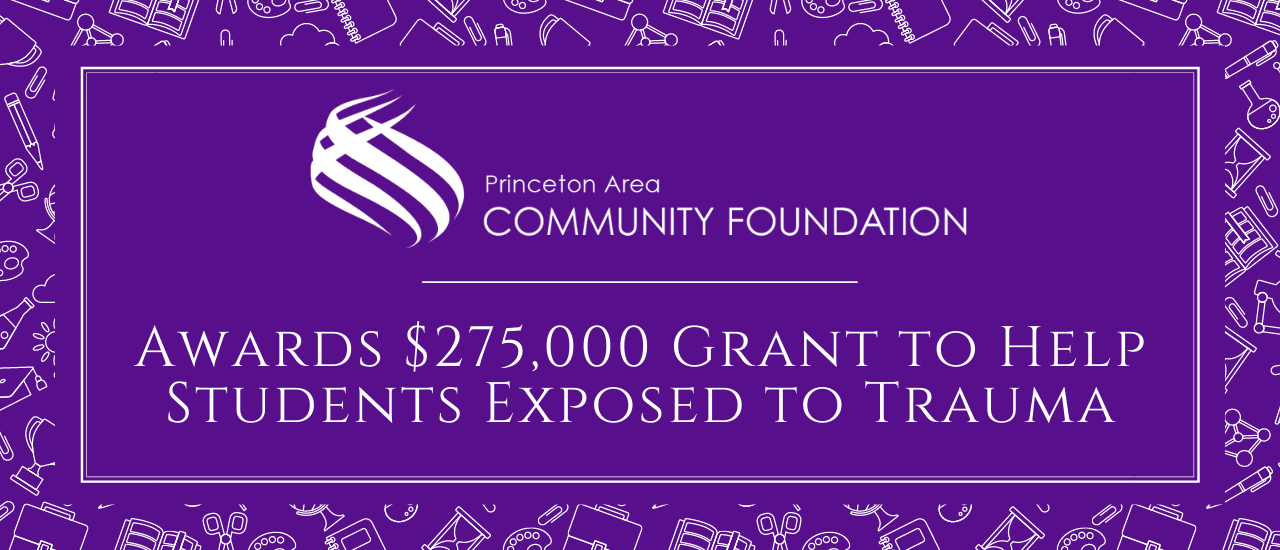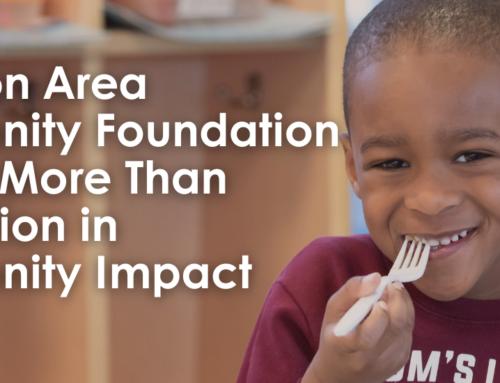Lawrenceville, September 30, 2021 — The Princeton Area Community Foundation has awarded a $275,000 grant to fund a program to teach school staff throughout Mercer County how to identify students exposed to stressful or traumatic experiences and how to engage all students in a way that promotes healing from the mental health effects of the pandemic.
The Foundation for Educational Administration’s (FEA) Healing Centered Engagement initiative will be funded with a $137,500 grant from the Community Foundation’s COVID-19 Relief & Recovery Fund and an additional $137,500 from a Community Foundation fundholder who wishes to remain anonymous.
“We want to thank the generous donors whose support made it possible for the Community Foundation to create the COVID-19 Relief & Recovery Fund, as well as the anonymous fundholder, who is providing significant funding for this much-needed program that will help so many of our schoolchildren,” said Sonia Delgado, Community Foundation Trustee and Chair of the Committee on Impact.
The program will be based on a statewide, pilot program created by the FEA earlier this year, and supported by grants from the Princeton Area Community Foundation, the Burke Foundation, the Geraldine R. Dodge Foundation, New Jersey Health Initiatives, and the NJ Pandemic Relief Fund, along with assistance from the NJEA, the Mental Health Association in NJ, the NJ Department of Education, the Office of Resilience in the NJ Department of the Children and Families. Three Trenton schools and one in Hamilton were part of the initial statewide cohort of 26 schools.
“We know that trauma can inhibit a child’s ability to learn, develop language skills, and create healthy attachments. The stress and isolation of the pandemic has contributed to worsening student mental health,” said Atiya Weiss, Executive Director of the Burke Foundation. “We are excited about this ground-breaking partnership to expand Healing Centered Schools in Mercer County in partnership with the Princeton Area Community Foundation. Supporting whole-school trainings on Adverse Childhood Experiences, trauma-informed approaches, and mental health will offer new tools to our educators and staff to help our children heal and thrive.”
The grant announced today will allow the FEA to expand the program to as many as 25 additional schools in Mercer County. Priority will be given to schools with a significant number of economically disadvantaged students.
“Every child returning to school has a COVID-19 story, and they have all experienced some level of trauma,” said Jeffrey M. Vega, President & CEO of the Community Foundation. “With this grant, the FEA will be able to train teachers and other school staff to recognize the signs of trauma and help create action plans to connect children and families to resources in the community.”
In pre-pandemic New Jersey, more than 40 percent of children – over 780,000 – experienced at least one stressful or traumatic experience, commonly called Adverse Childhood Experiences (ACEs), and 18 percent have experienced more than once ACE, research shows.
ACEs, which affect the architecture of a child’s brain, include experiencing neglect or abuse, witnessing violence in the home, or living with caretakers who have mental health struggles or substance abuse issues. Children who experience ACEs may suffer lifelong consequences.
In early years, it can inhibit a child’s ability to learn, develop language skills, create healthy attachments, and form relationships. Children who experience multiple ACEs are at higher risk of failing a grade and dropping out of school, according to the FEA.
Later in life, exposure to multiple ACEs can lead to chronic health problems, substance use, and negative impacts on jobs, according to the Centers for Disease Control, which worked with Kaiser Permanente on the original, landmark ACEs study in the 1990s.
In addition to ACEs, some children are also exposed to chronic, toxic stress caused by disparate educational and economic opportunities, related to systemic racism and poverty. The COVID-19 pandemic has exacerbated these issues, especially as it relates to job loss of family members and food and housing insecurity.
But positive experiences in childhood can counteract those negative impacts, and that is what the FEA program aims to do.
Children who experience ACEs sometimes act in ways that may seem disruptive, and as a result, may be disciplined by school staff. The FEA program helps school staff, including teachers, nurses, and counselors, learn how to recognize students who have experienced ACEs and toxic stress, so they can respond to them with social-emotional support.
Each school receives universal training, and select staff undergo intensive instruction so they can teach a Youth-Mental Health First Aid curriculum. The schools also work with coaches to develop plans to help students and staff heal from the effects of the pandemic.
Another important component of the program is connecting schools with the community. In some cases, staff at schools refer families to other nonprofit agencies for assistance. The program requires each school to have at least two community non-profit partners.
The FEA trained more than 2,000 school staff and community members in the first initiative. Staff at one school, participating in the first cohort, described the training as “truly invaluable.” Administrators participating from another school said the program garnered more positive feedback than any other training provided during that school year.
“By promoting sensitive, trusting relationships, we can create self-healing communities that are resilient in the face of adversity and place more New Jersey children on a path to a lifetime of better health and success,” said Mary M. Reece, Ed.D., the FEA’s Director of Special Projects. “We are grateful for the Community Foundation’s partnership on this remarkable project and look forward to continuing to partner as it grows and expands.”
—
About the Princeton Area Community Foundation
The Princeton Area Community Foundation promotes lasting philanthropy and builds community across Mercer County and central New Jersey. As a community convener, philanthropic resource, and manager of charitable funds, it helps people and companies make effective charitable gifts and awards grants to nonprofits. Since its founding in 1991, the Community Foundation has made grants of more than $154 million and provided an additional $21 million in support to our nonprofit fundholders. With over 400 charitable funds, in 2020, the Community Foundation awarded $19 million in grants to support the critical work of nonprofits in making the communities they serve more responsive to the needs of their residents. It has been named by Charity Navigator as One of America’s 10 Best Community Foundations. Learn more at www.pacf.org.






